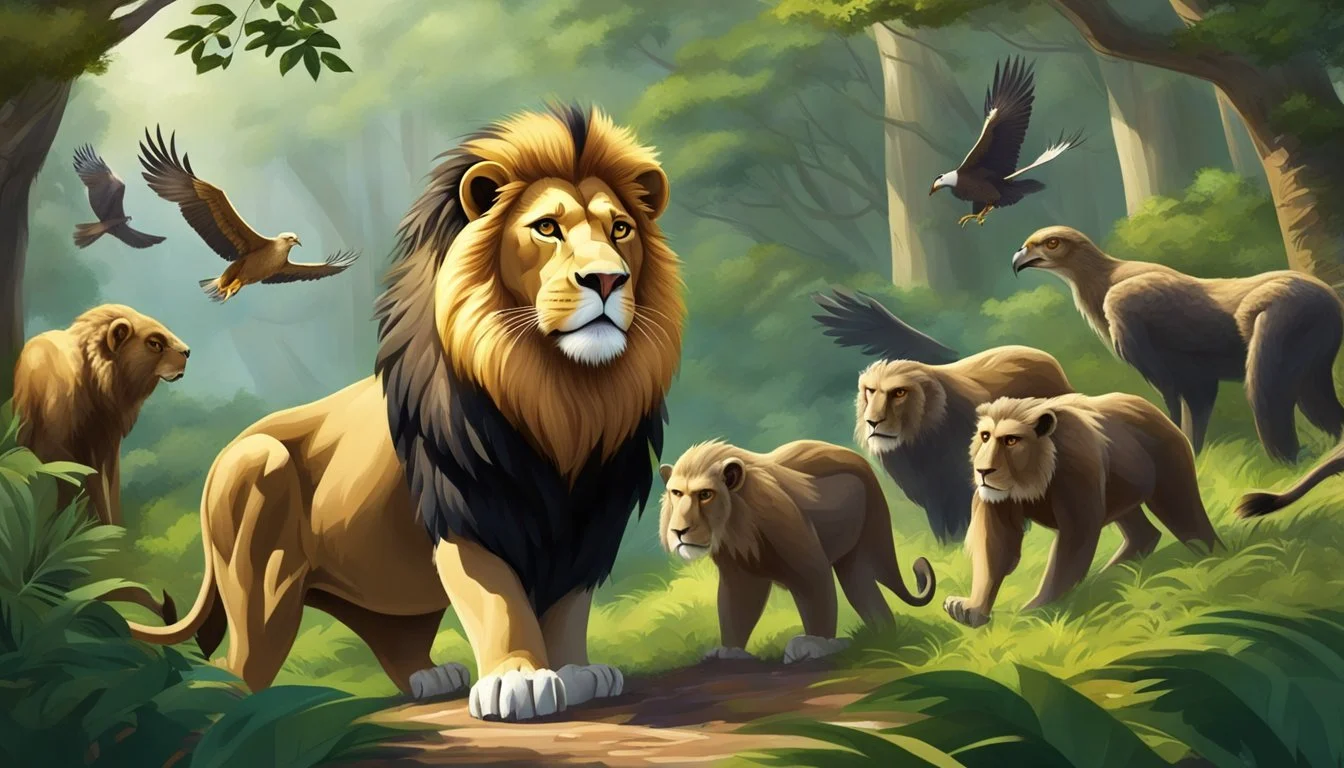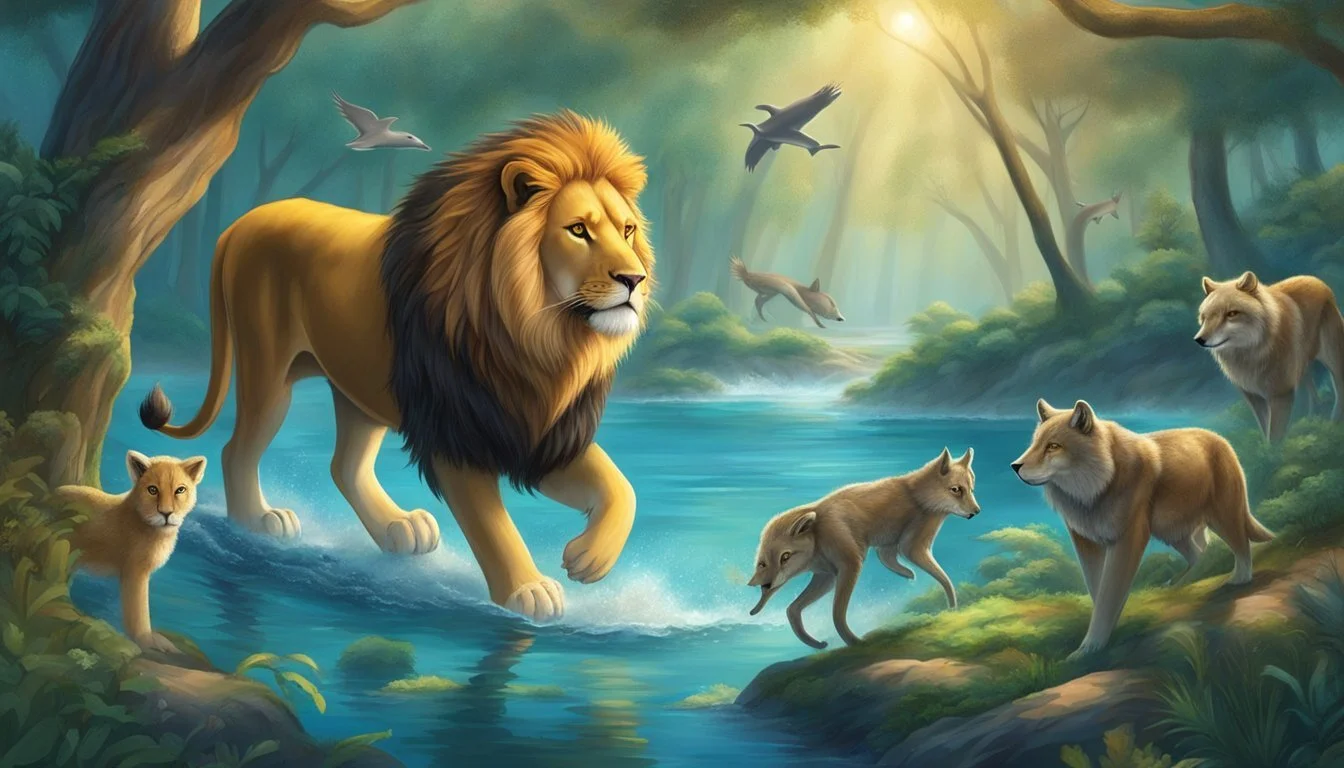Discover Your Inner Animal: The 4 Personality Types Animals Explained
The concept of animal personality types offers an intriguing lens through which to examine human behavior and traits. This approach draws parallels between animal characteristics and human personalities, providing a unique framework for self-reflection and interpersonal understanding.
The animal personality test categorizes individuals into four distinct types, each represented by a specific animal. By identifying with one of these animal archetypes, people can gain insights into their natural tendencies, strengths, and potential areas for growth. This classification system serves as a tool for enhancing self-awareness and improving communication in personal and professional relationships.
1) Chimpanzee: Known for their intelligence and social behavior
Chimpanzees are among the most intelligent animals on Earth. They display remarkable problem-solving skills and can use various tools to accomplish tasks. This cognitive ability allows them to adapt to different environments and challenges.
In social settings, chimpanzees exhibit complex behaviors. They form close-knit communities and engage in activities like grooming, which strengthens social bonds. Chimpanzees also communicate through facial expressions, gestures, and vocalizations.
Their intelligence extends to emotional awareness. Chimpanzees can experience and express emotions similar to humans, including happiness and sadness. This emotional capacity contributes to their intricate social dynamics.
Chimpanzees demonstrate cooperative behaviors within their groups. They work together for tasks such as hunting or defending territory. This collaboration showcases their social intelligence and ability to coordinate actions.
Research indicates that chimpanzees share many cognitive traits with humans. Scientists estimate that modern humans and chimpanzees diverged from a common ancestor between 6.5 and 9.3 million years ago, explaining some of these similarities.
2) Dolphin: Exhibiting playful and curious traits
Dolphins are known for their playful and curious nature. These intelligent marine mammals display a range of behaviors that showcase their inquisitive personalities.
Bottlenose dolphins, in particular, demonstrate high adaptability and exhibit various behaviors that set them apart from other species. They use echolocation to navigate and hunt in murky waters, showcasing their problem-solving abilities.
Dolphins are social creatures, often seen interacting with each other and even humans. Their friendly and outgoing nature is evident in their pod dynamics and interactions with boats and swimmers.
Curiosity is a key trait in dolphins. They frequently investigate new objects in their environment and show interest in novel stimuli. This natural inquisitiveness contributes to their ability to learn and adapt.
Playfulness is another defining characteristic of dolphins. They engage in activities like riding waves, leaping out of the water, and playing with seaweed or bubbles. These behaviors not only serve practical purposes but also appear to be done for enjoyment.
Dolphins exhibit emotional intelligence and empathy. They can sense and understand the feelings of others, both within their species and beyond. This trait contributes to their complex social structures and interactions.
3) Owl: Associated with wisdom and introspection
The owl is widely recognized as a symbol of wisdom and deep introspection. Its large, penetrating eyes seem to reflect an inner knowing and ability to see beyond surface appearances.
Owls are often associated with keen observation skills and intuitive insight. Their nocturnal nature connects them to the mysterious realms of darkness and the subconscious mind.
In many cultures, owls are viewed as spiritual guides and messengers. They are thought to possess ancient knowledge and the capacity for profound understanding of life's hidden truths.
People with owl-like personalities tend to be thoughtful, perceptive, and contemplative. They often prefer solitude and quiet reflection to social gatherings or small talk.
Owl types have a natural inclination toward philosophical thinking and analyzing complex ideas. They may be drawn to fields like psychology, spirituality, or the arts that allow for deep exploration of the human experience.
These individuals typically possess strong intuition and trust their inner wisdom to guide decision-making. They tend to carefully observe before acting and consider multiple perspectives on any issue.
4) Lion: Symbolizing leadership and courage
Lions represent strength, courage, and leadership in many cultures worldwide. Their majestic appearance and powerful presence have made them iconic symbols throughout history.
In nature, lions demonstrate remarkable leadership qualities within their pride. The male lion often takes charge, protecting the group and leading hunts. This behavior has inspired humans to associate lions with authority and guidance.
Lions' bravery is another key attribute that resonates with people. Their fearless approach to challenges and willingness to face dangers head-on embody the essence of courage.
Many societies have incorporated lion symbolism into their art, literature, and even national emblems. These depictions serve as reminders of the qualities associated with lions: strength, valor, and leadership.
The "Lion of God" title given to Ali, the Prophet Muhammad's son-in-law, highlights the respect and admiration for lion-like qualities in Islamic tradition. This association emphasizes the importance of honor and defending what is right.
In personal development, the lion spirit animal encourages individuals to tap into their inner strength and face obstacles with confidence. It inspires people to embrace leadership roles and guide others effectively.
Understanding Personality Types
Animal personality typing categorizes individuals into four distinct groups based on behavioral traits and tendencies. This approach offers insights into human nature and interpersonal dynamics.
The Four Animal Types Explained
The four animal personality types are Lion, Otter, Golden Retriever, and Beaver. Lions are assertive, goal-oriented leaders who take charge in situations. Otters are outgoing, enthusiastic, and social, often bringing energy to group settings.
Golden Retrievers are warm, empathetic, and supportive individuals who prioritize harmony. Beavers are detail-oriented, organized, and analytical, excelling in tasks requiring precision.
Each type has unique strengths and challenges. Lions may struggle with patience, while Otters might lack focus. Golden Retrievers can be overly accommodating, and Beavers may resist change.
Understanding these types can improve communication and teamwork in personal and professional contexts.
History of Animal Personality Typing
Animal personality typing was developed by Gary Smalley, an American family counselor and author. He built upon earlier temperament theories, including those of ancient Greek physicians and more recent psychologists.
Smalley's approach made personality concepts more accessible by using animal metaphors. This method gained popularity in the late 20th century, particularly in relationship counseling and team-building exercises.
The animal typing system shares similarities with other personality frameworks, such as the Myers-Briggs Type Indicator. However, it stands out for its simplicity and memorable animal associations.
Critics argue that such systems oversimplify human complexity. Proponents maintain that they provide valuable insights for self-awareness and interpersonal understanding.
Benefits of Knowing Personality Types
Understanding personality types based on animal characteristics can provide valuable insights into human behavior and interactions. This knowledge offers practical advantages in both personal and professional settings.
Improving Communication Skills
Recognizing different personality types helps tailor communication approaches. For "lion" personalities, direct and concise messages are most effective. "Otters" respond well to enthusiastic, creative conversations. "Beavers" appreciate detailed explanations and facts. "Golden Retrievers" value warm, supportive communication.
Adapting communication styles enhances understanding and reduces conflicts. It allows for more effective information sharing and problem-solving across diverse groups.
Awareness of personality types also improves active listening skills. It enables individuals to pick up on subtle cues and preferences, leading to more meaningful exchanges.
Enhancing Team Dynamics
Knowledge of personality types strengthens team collaboration. It helps leaders assign roles that align with individual strengths and preferences. "Lions" excel in leadership positions, while "Beavers" thrive in detail-oriented tasks.
Teams benefit from a balanced mix of personality types. "Otters" bring creativity and enthusiasm, complementing the steady reliability of "Golden Retrievers." This diversity fosters innovation and problem-solving.
Understanding personality types promotes empathy and mutual respect among team members. It reduces friction by helping individuals appreciate different working styles and motivations. This leads to increased productivity and job satisfaction.


